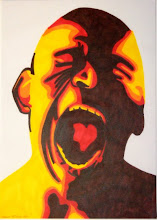Blue Velvet
I like to imagine that if Bobby Vinton, the crooner who's rendition of the song Blue Velvet so eloquently ties down the structure of David Lynch's masterpiece by the same name, were to sit today in a small, lush home theater and screen this film to himself in solitude, he would soon realize how unexpectedly his song translates into the world of rape, murder, and masochism.
Upon viewing Blue Velvet for a third time, I find myself less at the helm of the investigation at hand, and more able to behold the intensity of the heavy, tenebrous psychodrama that Lynch so aptly cloaks with the guise of a discernible thriller.
On first viewing, Lynch leads your nose to snooping with his trademark mystery wandering as though it actually has an end, embellished by his penchant for americana as well as elements of autobiography. His misleading build-up throughout the first half to three quarters is not meant to sucker in mass audiences (although this is often a laughable side-effect) but rather to establish an organized, logical world with which his baroque violence may later be compared.
In this style, the denouement's abrupt turn towards the cryptic still succeeds in allowing Lynch the freedom of real expression and time to cater to his obsessions (disfigurement, depravity, and hallucinatory episodes to name a few) without alienating his audience. He does not tire a less savvy crowd of viewers with the immediate onset of his artistic presence in the film, allowing instead a gradual comfort to accumulate wherein only moments of discomfort allude to the baroque fourth act of the film. It is the trickery of his seemingly purposeless narrative that lends the interference necessary for Blue Velvet's success in using diversion to communicate concept.
Jeffrey Beaumont mirrors the pet-shop naiveté of the virgin audience, trying to make sense of all the out of place and somewhat gruesome interruptions that seem to be appearing out of nowhere within the easily reproducible working-class landscape surrounding him. On this go around, however, I purposefully removed myself from the comfort zone of MacLachlan's impeccable comb-over to better observe the loose threads Lynch leaves sticking up out of the carpeting, unraveling each bit of evidence Lynch loosens intentionally to its shocking source.
The masculinity sought after by Jeffrey's Heineken lust works as a notion to be dwarfed by Frank Booth's rampant drug and booze virility. The somber severity on the faces of several of the men (namely Frank Booth) during Dorothy's performance at the Slow Club works to hint at an unstable male interaction that later snowballs into sadomasochism and forcing Jeffrey to strip at knifepoint. The over-pacifistic tone of Sandy's father when discussing the severed ear Jeffrey discovers rings softly of hushed control covering some internal mania, whispering some sort of connection between the figures of authority and the criminal conspiracy Lynch unveils suddenly towards the end of the film.
It is in these bread crumb trails that the mastery of Lynch's hand as an auteur is most strikingly beautiful, weaving an accessible neo-noir artifice with dozens of his obvious rations of absurdity. Lynch does so in such a calculated way that even as conspicuous and jarring as these moments appear, the audience still happily digests enough of Lynch's spoon-fed madness to send them fat and happy over the edge just as the plot deviates towards Blue Velvet's feast of lunacy and vicious hallucination served as the final entree of the film.
Lynch's talent for distraction and irrational attention allow his ambitious ideas and images, his intricacy in all aspects of design (mise-en-scene), his sense of language and sound and their powerful flexibility, and his reverence for human nature, human sexuality, and primal instinct, to seep into his governable viewers typically with little to no resistance. Unaware for most of the film of the cardinal directives Lynch is portraying, things usually seen by common society as difficult are discussed amidst the film's totality because Lynch is willing to be patient with sharing his theorems and ideologies, showing a respect for his viewers that is mindful of the individual appetite for new thought held by each different member of his audience.
skip to main |
skip to sidebar

About Me

- H.P. Willis
- - Film Maker - Visual Artist - Film Critic - Music Maker - Poem Writer - Blog Monster -
No comments:
Post a Comment